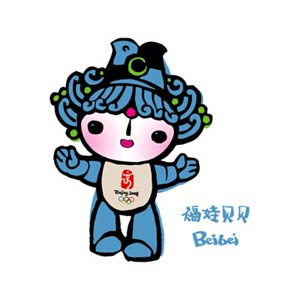OLYMPICS /
Cultural Olympics
Mascots, Auspicious Animals
Chinaculture.org
Updated: 2008-08-09 13:35
Like the Five Olympic Rings from which they draw their color and inspiration, Fuwa serve as the Official Mascots of Beijing 2008 Olympic Games, carrying a message of friendship and peace and good wishes from China.
Fuwa embody the natural characteristics of four of China's most popular auspicious animals -- the Fish, the Panda, the Tibetan Antelope, the Swallow and the Olympic Flame.
Beibei is the Fish with water designs. In China's traditional culture and art, the fish and water designs are symbols of prosperity and harvest. And so Beibei carries the blessing of prosperity. A fish is also a symbol of surplus in Chinese culture, another measure of a good year and a good life. The patterns from Beibei's headgear come from artifacts unearthed at Banpo, site of a Neolithic village of the Yangshao culture. The ornamental lines of the water-wave designs are taken from well-known Chinese paintings of the past. Among Fuwa, Beibei is known to be gentle and pure. Strong in water sports, she reflects the blue Olympic ring.

|
Jingjing is the Giant Panda in black and white. Jingjing makes children smile -- and that's why he brings the blessing of happiness wherever he goes. You can see his joy in the charming naivety of his dancing pose and the lovely wave of his black and white fur. As a national treasure and a protected species, pandas are adored by people everywhere. The lotus designs in Jingjing's headdress, which are inspired by the porcelain paintings of the Song Dynasty (960-1234), symbolize the lush forest and the harmonious relationship between man and nature. Jingjing was chosen to represent our desire to protect nature's gifts -- and to preserve the beauty of nature for all generations. Jingjing is charmingly naïve and optimistic. He is an athlete noted for strength who represents the black Olympic ring.